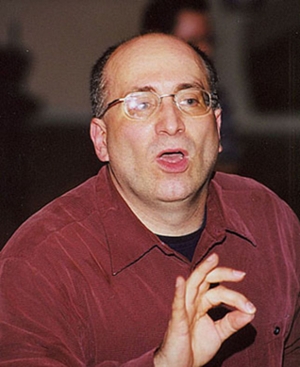Helping artists CREATE
Grant will help Purdue composer record tribute to his mother

Brad Bodine wrote a song to honor his father 30 years ago. He has been trying to pay similar tribute to his mother ever since, but has never been satisfied with the results – until now.
“Everything I composed in honor of my mother fell short,” said Bodine, a continuing lecturer of music theory in the Rueff School of Design, Art, and Performance. “So I said, ‘OK, what I’m going to do is write a ‘Salve Regina’ choral piece and take great care. People will be able to hear that great care that I’ve taken to write that piece of music, and that will share something about the great care my mother took to raise me.’”
Bodine’s mother, Sally, has not yet heard the piece, but she will soon be among the first to experience the results of her son’s work.
The St. Thomas Aquinas Chorale and the Purdue Musical Organization’s University Choir will perform separately and then collectively debut his 10-minute “Salve Regina” – a hymn focused on the Virgin Mary – at a concert on Wednesday, Feb. 20 at 7 p.m. at St. Thomas Aquinas Catholic Church.
Sally plans to attend, and the dedication Bodine included on the first page of the event program reads, “To the Blessed Virgin Mary, and to my mother, Sally Sue Bodine, sources of grace in my life.”
Hearing a composition performed for the first time is always emotional, Bodine said. It would be understandable if that is especially the case this time given the familial connection to this particular piece.
“Every time I go to a premiere, I tell my wife, ‘I’m going to stay real calm and just kind of kick back and listen this time and just have fun,’ and by the end of the thing, I’m grabbing my chair really hard,” said Bodine, who also serves as musical director at St. Tom’s. “It’s a part of you that’s going on display, so it’s always a little scary.” Bodine’s “Salve Regina” will also soon become a recorded piece thanks to a CREATE grant Purdue’s College of Liberal Arts provided to four composers on the Music Division’ faculty roster.
The grant will cover the costs associated with hiring the Lafayette Chamber Singers to record the four compositions – by Bodine, Rick Thomas, Harry Bulow, and Allen McCullough – this year in three sessions with engineer and producer Maurice Mogridge.
“Dean David Reingold created this new fund, which is kind of a godsend because funding for the arts externally is just so difficult to come by,” said Thomas, a professor of visual and performing arts.
Rueff School head Bulow’s composition, “Alleluia,” is an a capella piece based upon the Old Testament Hebrew text of Psalm 90. Meanwhile, continuing lecturer McCullough’s contribution will be selected from three of his original choral works, either “Evening Song,” “Psalm 23,” or “Adonais.”
The fourth piece slated for recording is Thomas’ contribution: a piece based upon the text of Edgar Allen Poe’s “Annabel Lee.” It was originally commissioned by Louis Lerner for the Chicago College of the Performing Arts and first performed in 1999 and 2007 at Chicago’s Roosevelt Theatre.
“Louis Lerner really wanted a piece based around ‘Annabel Lee,” and Joel Fink (director of the Theatre Conservatory of the Chicago College of Performing Arts and former Purdue faculty member) had this idea of creating an evening of Poe pieces,” Thomas said. “He and I have worked together for several decades, so everything that we do ends up being like a musical, even if it’s Shakespeare. … Usually what happens is I’ll compose a score for the show and then he’ll stage the show to the score, so we collaborate really closely on developing the score.”
Thomas touted the upcoming recording sessions as an opportunity to engage with the Greater Lafayette arts community. Not only are Mogridge a noted local engineer and the Lafayette Chamber Singers a local group, but the singers are under the direction of Clayton Lein, professor emeritus in Purdue’s English department.
Thomas said one of the group’s goals is to also perform the compositions publicly, perhaps in the concert season following the successful recording of the pieces. However, the primary objective of the grant project was to record the artists’ material so that it can be distributed in a fixed format and possibly performed in other locations throughout the world, as Bulow explained in the group’s grant application.
“Without a recording of a work, it remains a vehicle without wheels,” Bulow wrote. “Essential to a composer’s life is the need for acquiring quality recordings of one’s musical compositions.”